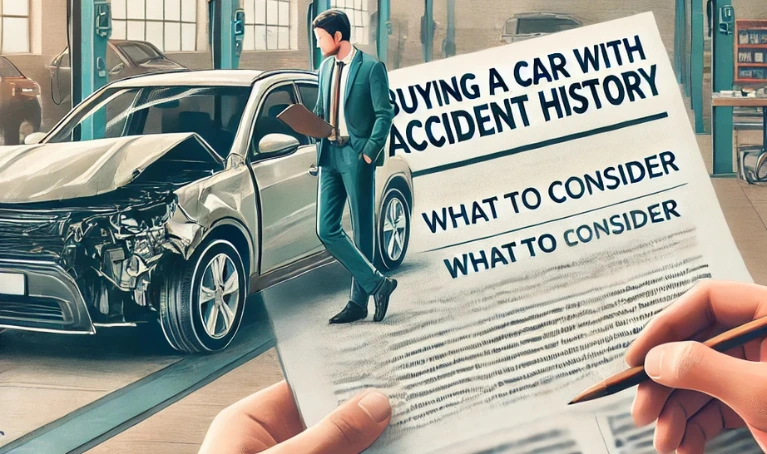Buying a used car can be an excellent way to get a reliable vehicle at a lower cost. However, when a car has an accident history, it raises specific questions and concerns about its reliability and value. Can you still buy a car with an accident history? What risks might be involved, and is it worth the potential savings? In this guide, we will explore everything you need to know about purchasing a car with accident history, including potential benefits, risks, and essential checks you should take to ensure you make an informed decision that best suits your needs.
Table of Contents
What Does It Mean to Buy a Car with Accident History?
Purchasing a car with an accident history means buying a vehicle that has been involved in one or more collisions, as reported through records like Carfax or AutoCheck. While an accident can significantly affect a car’s resale value and reliability, this doesn’t automatically mean it’s a bad purchase or that it should be avoided. However, buying such a car requires more careful consideration, as you’ll need to ensure the repairs were done well and that the car remains safe and functional for long-term use.
What to Expect if You Buy a Car with an Accident History
Accidents can impact various aspects of a car, from its resale value to its performance and reliability on the road. Here are some of the main things to anticipate if you decide to buy a vehicle with a recorded accident:
- Lower Resale Value: Cars with accident histories generally sell for much less than those with clean records. This can be an advantage when buying as you may save money initially, but it could impact you if you decide to sell the car later on.
- Possible Ongoing Issues: Depending on the severity of the damage and the quality of repairs, some issues related to the accident could linger, potentially affecting the car’s reliability over time.
- Higher Insurance Premiums: Some insurance providers may charge more for insuring vehicles with accident histories. This is because these cars are often perceived as having higher repair risks.
- Warranty Considerations: It’s important to check if the accident voided any existing warranties on the car, as this can significantly affect your future repair costs and may limit the car’s value.
Key Points to Check When Buying a Car with an Accident History
Before purchasing a car with a prior accident, it’s essential to examine these critical areas to determine its condition and ensure you’re making a wise investment that aligns with your expectations.
1. Get a Detailed Vehicle History Report
- Purpose: This report, often from sources like Carfax or AutoCheck, will reveal details like the extent of previous damages, the quality of repairs, and any repeated issues.
- Key Areas: Look for signs of major structural repairs, whether airbags were deployed, or if the frame was damaged. Knowing the accident type can help you assess the car’s potential long-term impacts.
2. Inspect Repair Quality
- External Inspection: Walk around the car to check for paint mismatches, uneven body panels, or any rust that could indicate poor repair work that could worsen over time.
- Internal Check: Look at key internal parts like suspension and alignment to ensure everything is in good working condition.
- Professional Opinion: A pre-purchase inspection from a trusted mechanic can provide deeper insights, ensuring that the repairs meet industry standards for safety and durability.
3. Frame and Structure Check
- Cars with frame damage may still be drivable, but they often have compromised structural integrity, which can be risky. Be sure to ask if the repairs restored the frame to meet manufacturer standards for strength and stability.
4. Test Drive for Unusual Sounds or Handling Issues
- Take the car on a test drive to observe any unusual sounds, pulling, or vibrations. These signs can indicate misaligned or damaged parts from the accident that weren’t adequately repaired, which could impact your driving experience.
5. Insurance and Warranty Verification
- Verify if the car still qualifies for an extended warranty or if it has a remaining warranty from the manufacturer or dealer. Some warranties are voided if the car was declared a total loss or had extensive repairs.
- Inquire about the insurance rate differences for vehicles with accident histories, as this may affect your overall long-term ownership costs.
Pros and Cons of Buying a Car with an Accident History
Advantages
- Lower Purchase Price: Cars with accident histories are often more affordable, allowing you to get a higher-end model or one with more features at a lower cost.
- Reduced Depreciation: Since accident cars have already depreciated more due to the history, they may retain their value more steadily over time if they remain well-maintained.
- Potential for Quality Repairs: If the damage was minor and the repairs were done to high standards, the car could still offer reliable performance and function just as well as a car without an accident history.
Disadvantages
- Lower Resale Value: Reselling a car with an accident history may be challenging, as buyers generally prefer vehicles without accident records and may be wary of potential issues.
- Insurance Costs: Depending on the type and severity of the accident, you may face higher insurance premiums from some providers.
- Potential Hidden Issues: Poor-quality repairs can lead to unexpected repair and maintenance needs in the future, which can add to your ownership costs over time.
Conclusion
Buying a car with an accident history is a personal decision that ultimately comes down to balancing cost savings with potential risks. By carefully reviewing the car’s repair records, conducting a thorough inspection, and consulting with a professional mechanic, you can make an informed decision that suits your financial and practical needs. Remember, with the right knowledge and precautions, purchasing a vehicle with an accident history can be a cost-effective and rewarding choice.
Frequently Asked Questions
How does accident history affect car value?
Accident history typically lowers a car’s market value since most buyers prefer vehicles with clean records. The depreciation impact will depend on the accident’s severity and the repair quality.
Is a car with an accident history worth buying?
Yes, if the car has been professionally repaired and the damage was not too severe, it can be a valuable purchase. However, weigh factors like lower resale value and potential maintenance issues.
Will a fender bender show up on Carfax?
Minor accidents like fender benders often appear on Carfax if they were reported. It’s important to review the full report to understand the damage’s extent and any related repairs.
Why are cars that have been in accidents cheaper?
Cars with accident records tend to have lower resale values as buyers perceive them as higher-risk. The discount reflects potential concerns about reliability and future resale.

